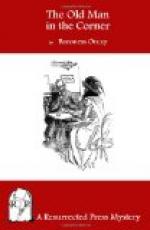“’After he had been with my master about an hour I was called in, and Mr. Wethered said to me that Mr. Brooks wished me and one other of us servants to witness that he had signed a paper which was on a table by his bedside. I called Pat Mooney, the head footman, and before us both Mr. Brooks put his name at the bottom of that paper. Then Mr. Wethered give me the pen and told me to write my name as a witness, and that Pat Mooney was to do the same. After that we were both told that we could go.’
“The old butler went on to explain that he was present in his late master’s room on the following day when the undertakers, who had come to lay the dead man out, found a paper underneath his pillow. John O’Neill, who recognized the paper as the one to which he had appended his signature the day before, took it to Mr. Percival, and gave it into his hands.
“In answer to Mr. Walter Hibbert, John asserted positively that he took the paper from the undertaker’s hand and went straight with it to Mr. Percival’s room.
“‘He was alone,’ said John; ’I gave him the paper. He just glanced at it, and I thought he looked rather astonished, but he said nothing, and I at once left the room.’
“’When you say that you recognized the paper as the one which you had seen your master sign the day before, how did you actually recognize that it was the same paper?’ asked Mr. Hibbert amidst breathless interest on the part of the spectators. I narrowly observed the witness’s face.
“‘It looked exactly the same paper to me, sir,’ replied John, somewhat vaguely.
“‘Did you look at the contents, then?’
“‘No, sir; certainly not.’
“‘Had you done so the day before?’
“‘No, sir, only at my master’s signature.’
“’Then you only thought by the outside look of the paper that it was the same?’
“‘It looked the same thing, sir,’ persisted John obstinately.
“You see,” continued the man in the corner, leaning eagerly forward across the narrow marble table, “the contention of Murray Brooks’ adviser was that Mr. Brooks, having made a will and hidden it—for some reason or other under his pillow—that will had fallen, through the means related by John O’Neill, into the hands of Mr. Percival Brooks, who had destroyed it and substituted a forged one in its place, which adjudged the whole of Mr. Brooks’ millions to himself. It was a terrible and very daring accusation directed against a gentleman who, in spite of his many wild oats sowed in early youth, was a prominent and important figure in Irish high life.
“All those present were aghast at what they heard, and the whispered comments I could hear around me showed me that public opinion, at least, did not uphold Mr. Murray Brooks’ daring accusation against his brother.
“But John O’Neill had not finished his evidence, and Mr. Walter Hibbert had a bit of sensation still up his sleeve. He had, namely, produced a paper, the will proved by Mr. Percival Brooks, and had asked John O’Neill if once again he recognized the paper.




